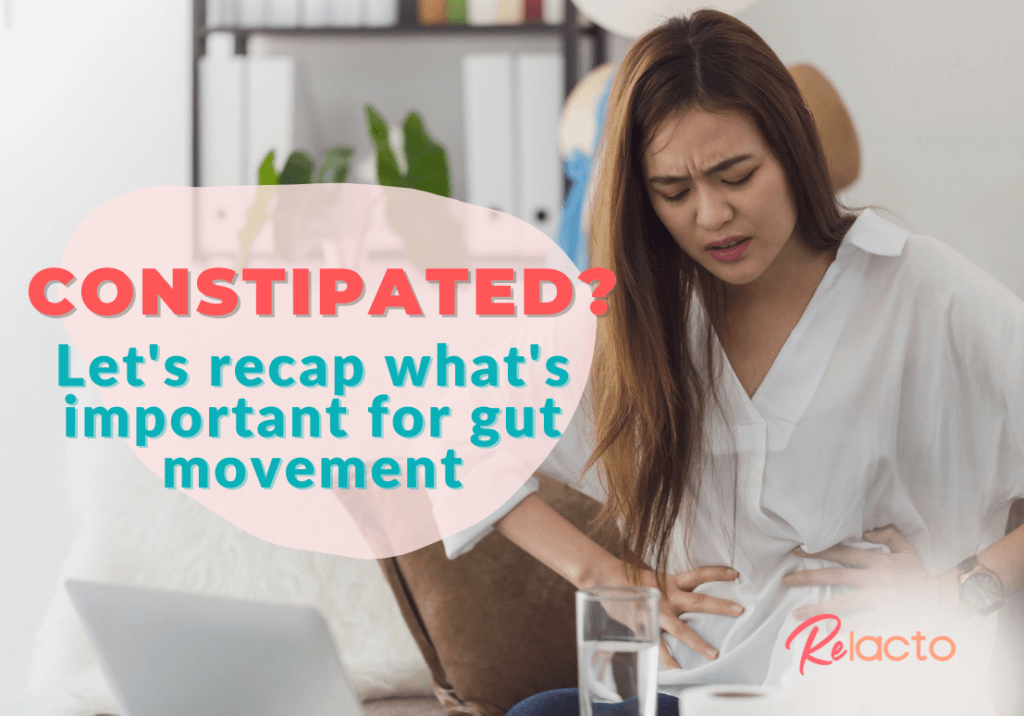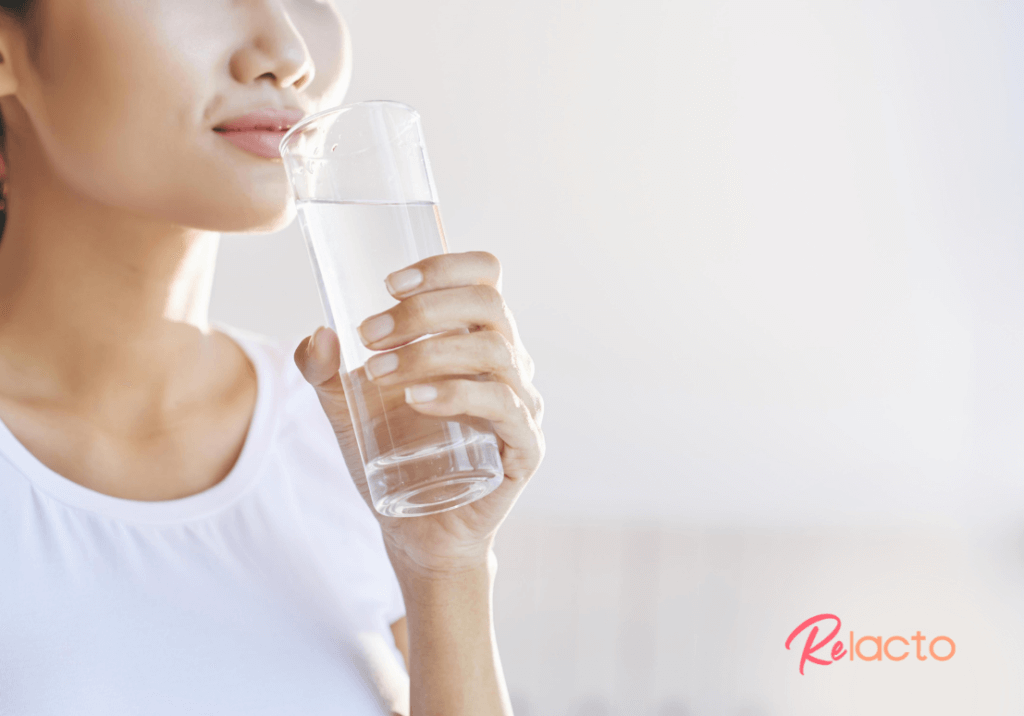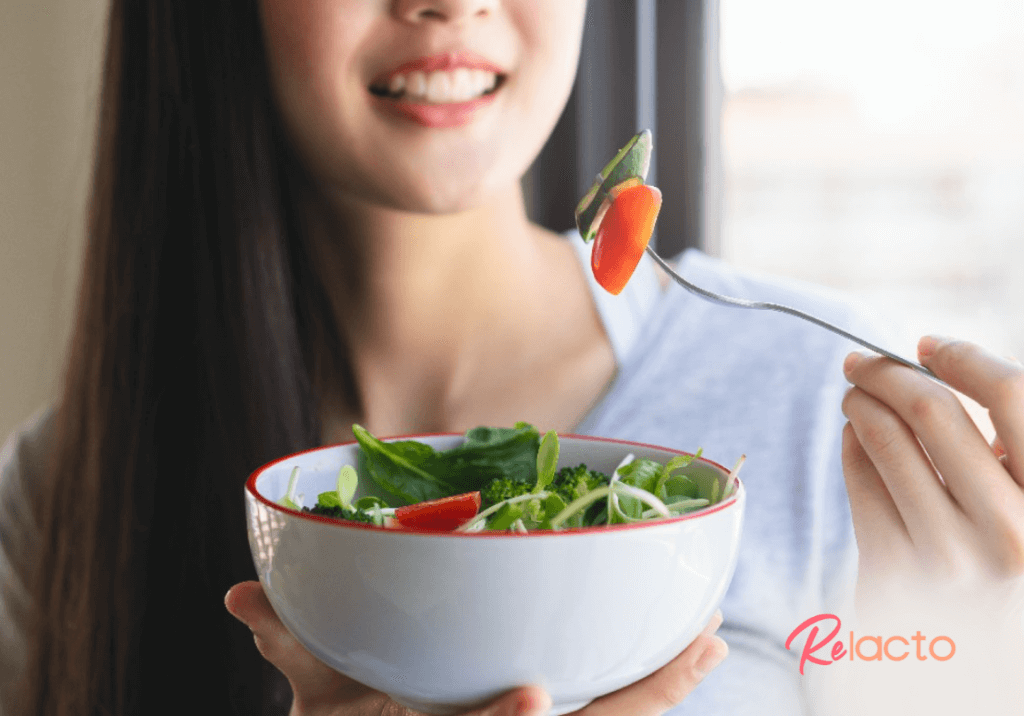Constipated? Let’s Recap What’s Important for Gut Movement!

Today, we are looking at constipation. Constipation is defined as a condition in which you may have fewer than three bowel movements a week; stools that are hard, dry, or lumpy; stools that are difficult or painful to pass; or a general feeling that not all stool has passed
Often, constipation will go away on its own within a few days or get better after you use laxatives or other constipation treatment, but for breastfeeding mothers, we do not recommend laxatives unless absolutely necessary and with the express approval of a professional healthcare professional.
Now that we know what constipation is, as defined medically, and how long it generally lasts, you might be wondering about how it came about. Given that you did click on this article, we’re quite sure you did that out of wanting to learn more. So, strap in while we give you a rundown on the causes of constipation.
To understand the causes, we first need to take a look at the word itself…alright, maybe not a need, but it’s still a fun thing to do nonetheless and it does shed some light when it comes to understanding this affliction or malady.
Etymology
Constipation is said to have its roots in late Latin with the etymology tracing itself to the word “Constipare”. What’s interesting about this is that it’s really made up of two words – “Con” meaning together, and, “Stipare” meaning to cram or pack. Thus, when you have constipation, it’s more or less saying that you have stuff that’s…well…stuffed together. Now, things do not get stuffed together willy nilly. This is where we have to take a look at the various causes that may lead to constipation. Note that we use the word “may” as diets may vary and Chicken Rice that may cause diarrhoea to one person may end up clogging another person’s internal plumbing.
Causes
One strong suspect in causing constipation is having a baby. Yes, just having a baby can be the cause of constipation and the following are reasons why that happens:
1. Anesthetics
Yes, mothers do not have it easy. You’ve given birth and, now, as you look at your little bundle of joy, all that pain is replaced with happiness…but, your body doesn’t see what you see and still remember what’s been done to it. While under, for the operation, the anesthetic used during surgery may make your muscles sluggish and since you need muscles to contract and move in order to actually evacuate the stuff that’s stuffed together, the sluggishness would make it rather difficult to move the stuffings.
2. Damage To Pelvic Floor Muscles
While on the topic of giving birth, oftentimes, the stretching that your body goes through during labour and delivery can make it more difficult for your body to efficiently move muscles that are needed in the evacuation of unwanted human bodily wastes.
3. Lack Of Fluids
This is true for many mothers, especially right after labour. Childbirth causes not only blood loss but fluid too which leads to higher risk of dehydration and constipation. So it’s important to keep yourself hydrated throughout labour. Other than that, breastfeeding mothers are also particularly prone to constipation too. As you guessed, they are breastfeeding their baby often, thus it’s important to be hydrated throughout the day.
4. Stress
Speaking of breastfeeding mothers and having a billion things to do, this brings us to the issue of stress. Who would’ve thought that having a little watermelon-sized version of you could be so stressful, right? Apparently, your body thinks so. This stress, especially if it is your first pregnancy, will throw your cycles off regardless of whether it’s your sleep cycle, eating cycle, your unicycle, everything gets thrown around and that causes spikes in hormones like cortisol which can cause diarrhoea in some people, but may have the exact opposite effect in others hence constipation.
5. Fear
A final note on this issue of pregnancy-induced constipation would be that it could merely be all in your head. Here’s why – fear of pain. C-sections are notorious for having stitches post-op…now, that’s not to say that a vaginal birth won’t involve stitches at all. Whichever it is you opt (or opted) for, as long as there are stitches, there will be the inherent risk of rupturing your stitches. If that sounds unpleasant to you, well, that may be because it is. All the more reason to drink plenty of fluids, have adequate fruits and vegetables, and have regular walks 30 minutes a day will make passing motion a better experience. You cannot afford to be constipated and put additional pressure on that area!
Treatments
Things are not all doom and gloom, however, there are treatments that can be done to alleviate, if not fully treat your inability to expel…processed foods. Be warned, the following treatments are not for the faint of heart…or…at the very least…not for those who have medical conditions which require the approval of a healthcare professional before trying some of the methods of treatments.
1. Drink Plenty of Fluids

This harkens back to our earlier talk about breastfeeding. We place emphasis on this one as it can easily dehydrate you to produce milk. That, in conjunction with the fact that water gets absorbed from your stools while it is still in your body anyway, it’s prudent to be drinking as much water as you can throughout the day so that nothing gets overly dry. Drink water, drink soups, drink shakes. Basically, drink anything that does not dehydrate you…which means less of that coffee and tea. If you really do have to have your morning coffee, you’ll have to top up on the 8-10 glasses of water daily intake to offset the diuretic (dehydrating) effect of that Starbucks Venti, Light Iced, Skinny Hazelnut Soy Macchiato, Sugar-Free Syrup, Extra Shot, No Whip, and Chocolate Sauce.
2. Exercise Regularly
Simply getting up and having a little move around will do wonders for your digestive system and keep your digestive tract healthy. You want to keep your blood flowing since after meals, blood flows away from your stomach which means less movement and food moves sluggishly. Now, bear in mind that you’ve probably just given birth and are in that confinement phase so haven’t fully recovered yet, so do check with your doctor first before signing up for a 12k run.
3. Improve Posture & Timing
Since modern plumbing innovations have stopped us from defecating out in public and allowed us to move things indoors, gone are the days when we had to squat over some hole in the ground in some shack outside of our houses or some mini house outside of our house…an outside house…let’s just call it an outhouse. During those days, people squatted and this seemed to have been the most natural way of going about it as the elevation of your knees in that position allows for less strain and more complete bowel movements as it lets your rectal muscles relax in a straight line. In addition to this point, you might want to listen to your body and go when you have to and regularly so.
4. Maintain a Well-Balanced Diet

Finally, since we have established that constipation really is a bunch of stuff coming together and getting stuffed, you could either not put in stuff to get stuffed which is almost impossible since we all love food! The alternative is to be very careful with what you are putting in. Thus, we recommend a well-balanced diet. We all know the nutrient classes like carbohydrates, vitamins, minerals, etc. What you really want to do this time is listen to those older folks who keep thinking that more veggies is the key to eternal life; in this instance, they are right…not about eternal life, but veggies can serve as a good source of fibre and that promotes bowel movement…think of it as a sort of lubricant that allows your hard, dry, and lumpy thing to slide through easily. Adequate fruits and vegetable portions are 2 servings of fruits and at least 2 servings of vegetables daily.
Another term you may have come across when looking for a breastfeeding diet plan menu would be that of “Roughage”, also known as fibre Those are fibrous indigestible plant matter which can aid in the passage of food and waste products through your gut, such as grains, brown rice, bran, nuts, beans, and bread.
ReLacto: Healthy Meal Plan for Breastfeeding Mothers
Speaking of a well-balanced meal, what do you think of a meal plan that consists of the staple of the day, a meat dish, a vegetable dish, a nourishing soup, and a lactation drink which will all be delivered to you daily for lunch and dinner? That’s a rather complete meal that sounds absolutely like it covers all the food groups that your body needs. Well, let us introduce you to ReLacto. We offer complete balanced meals which provides lots of fibre and fluid so you won’t have to worry about constipation, especially if you are breastfeeding as our meals are all planned with the guidance of our in-house dietitian with an emphasis on using lactogenic ingredients so you’ll be assured of eating the best foods for lactation. Strike now while the iron is hot…and we are not talking about household chores. Take a look at our site to learn more about our huge variety of tasty lactation meals today!







